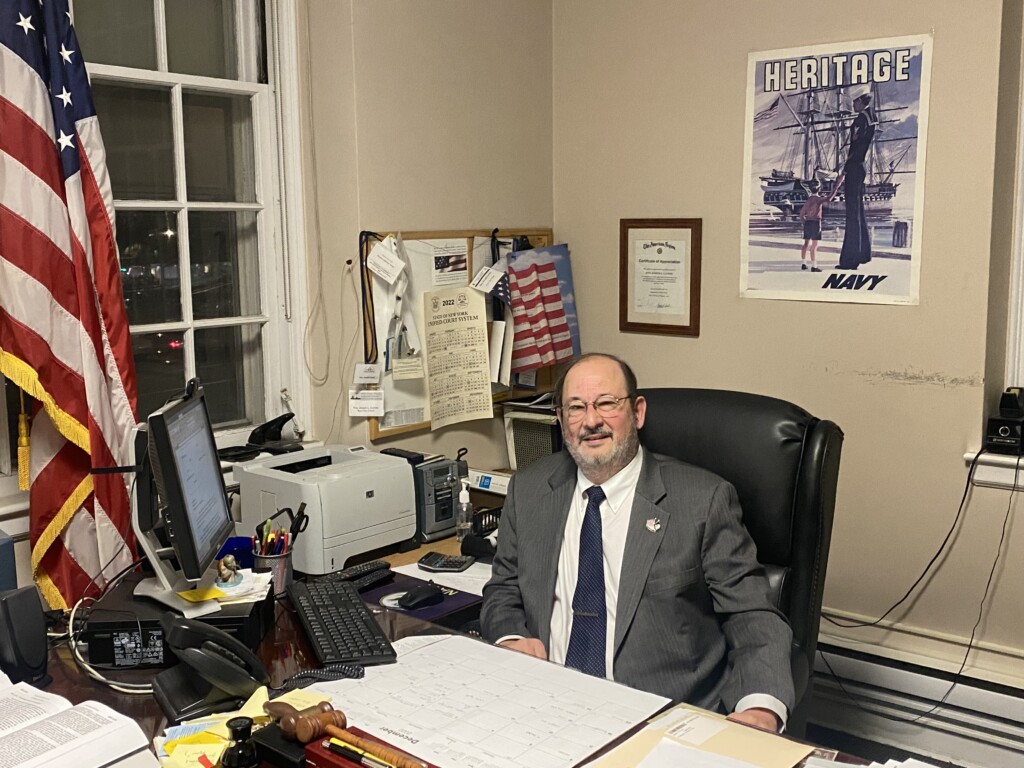
Holding Court is a series by retired Rye City Court Judge Joe Latwin. Latwin retired from the court in December 2022 after thirteen years of service to the City.
What topics do you want addressed by Judge Latwin? Tell us.
If you have failed to appreciate Latwin’s humor to date, this week he just might hook and land you on the deck of the USS Holding Court.
By Joe Latwin
If you are unfortunate and a family member is wrongfully killed, under current New York law, the damages you may be able from the wrongdoer are limited to pecuniary – meaning economic, losses. New York is only one of three States that restrict recovery. Alabama and Delaware are the others. This limitation was created in 1847 and has remained unchanged. The other 47 States permit recovery of damages by surviving family members for grief, pain, or anguish caused by the decedent’s death. New York does not.
Currently, New York law allows certain relatives to file a wrongful death lawsuit. The plaintiff must show: (1) The death of a person; (2) The death was caused by wrongful conduct or negligence of another; (3) The wrongful conduct/negligence could be subject of a lawsuit where the person harmed could have recovered damages (such as pain and suffering) if they didn’t die; and (4) There are survivors who have suffered specific pecuniary damages due to the death. The plaintiff may recover: (1) Lost earnings; (2) Loss of support; (3) Medical expenses; (4) Funeral and burial costs; and (5) pain and suffering of the decedent.
Relatives cannot recover for their own grief, mental anguish, or similar emotional damages, as such losses are not considered pecuniary. The existing law primarily benefits the survivors of high-wage earners living in a traditional family structure. It produced an arbitrary, inheritance-based system in which recognition of loss is tied to whether you were the closest blood relative, and the magnitude of the loss is tied to the decedent’s income.
If couples were unmarried domestic partners, the surviving partner would be deemed to have no loss. The current law reflects outdated concepts that don’t account for how people live and how we value family in the 21st century. A grandparent raising a grandchild is deemed to have no loss if the grandchild is wrongfully killed. The death of an elderly person is often not an economic loss under the current statute because the elderly often have limited income. Similarly, babies and children have no value, as the expense of raising them far exceeds any income they produce. The death of a worker is valued based simply on their occupation and the length of time they would have continued to work under the current statute. It enshrines the idea that the lives of poor victims are worth less than those of wealthy victims.
To bring New York’s law into modern times, provide greater equity for survivors, and create a statutory framework for such actions, the Legislature beginning in 2009, submitted bills that would allow surviving close family members to recover for grief or anguish caused by the decedent’s death. It also recognized damages for loss of love, society, protection, comfort, companionship, and consortium. Recovery for emotional damages would not be limited to just those who inherit the decedent’s property. In 2021, both Houses of the Legislature passed the Grieving Families Act. However, the Governor vetoed the bill. In 2023, responding to the veto, the Legislature passed a modified Grieving Families Act. Again, the Governor vetoed it. The Legislature passed another Grieving Families Act. In December 2023, the Governor again vetoed to bill.
Newsletter Signup
The Grieving Families Act garnered significant support from families and advocates who contend that the current limitations on recoverable damages fail to adequately address the losses suffered by the loved ones of wrongful death victims. Critics of the bill, primarily representing defendants, their insurance companies, and some business associations, raise concerns regarding potential confusion, increased costs, and the possibility of competing claims for damages. They argue that the revised legislation could strain insurance resources and disrupt the stability of insurance coverage.
Where do you stand?

